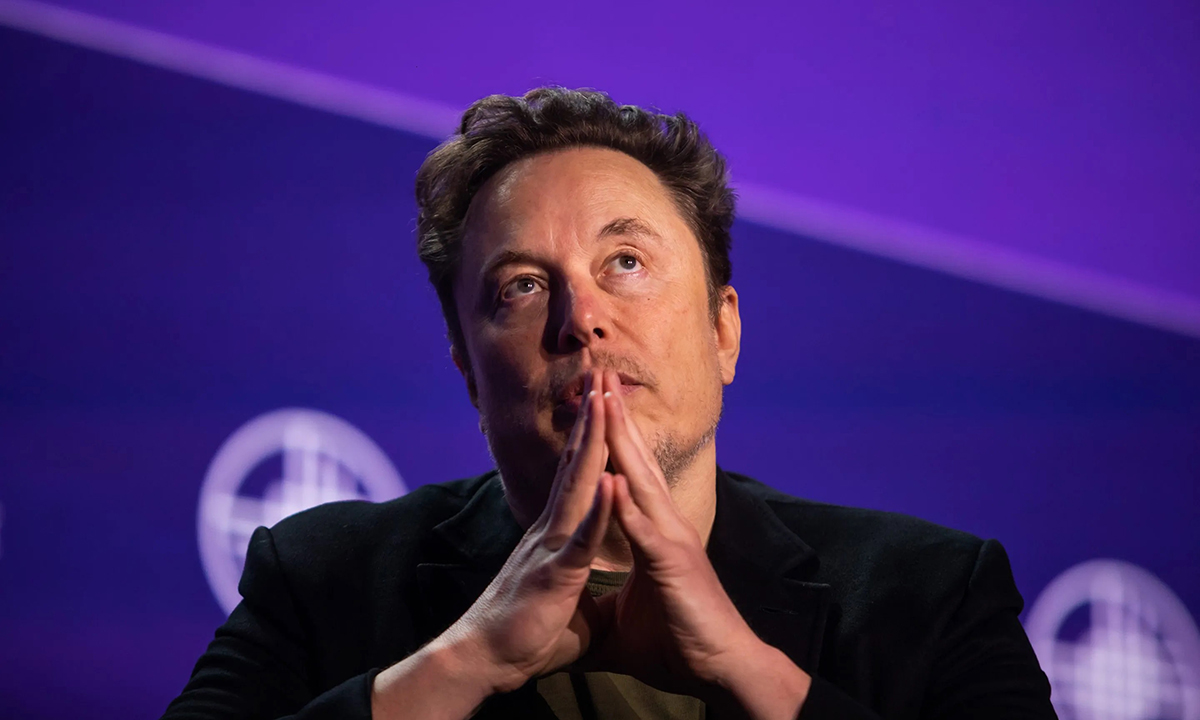
6月11日,蘋果宣布將把OpenAI的ChatGPT集成到其技術中,特斯拉(Tesla)首席執(zhí)行官埃隆·馬斯克迅速做好防御準備以對抗這項競爭對手的技術。
馬斯克曾是世界首富,他正在電動汽車制造商特斯拉和初創(chuàng)公司xAI開發(fā)自己的人工智能模型。
xAI已經(jīng)發(fā)布了一個名為Grok的大型語言模型。
但ChatGPT不僅是馬斯克自家產(chǎn)品的競爭對手,他本人還與這家由山姆·奧特曼(Sam Altman)領導的公司有過一段不愉快的歷史。
馬斯克是這家人工智能公司最早的支持者之一,并在公司成立之初(與奧特曼一起)擔任首任聯(lián)合主席。
2018年馬斯克離職后,雙方關系惡化。隨之而來的是口水戰(zhàn)和產(chǎn)品競爭,最終馬斯克對奧特曼和OpenAI發(fā)起了一場持續(xù)的訴訟。
因此,當馬斯克聽到蘋果宣布“將ChatGPT功能整合到iOS 18、iPadOS 18和macOS Sequoia的用戶體驗中,讓用戶無需在不同工具之間切換就能獲得專業(yè)知識,并且使用圖像和文檔理解功能”時,他的憤怒也就不足為奇了。
馬斯克在其社交媒體平臺X(前身為Twitter)上表達了對這一合作關系的擔憂。
他寫道:"如果蘋果在操作系統(tǒng)層面整合OpenAI,那么我旗下的公司將禁止使用蘋果設備。這是不可接受的安全違規(guī)行為。”
“訪客必須在門口交出他們的蘋果設備,這些設備將被存放在法拉第籠中。”
法拉第籠是用來屏蔽某些電磁場的。
‘人工智能隱私新標準’
在加州舉行的全球開發(fā)者大會(Worldwide Developers Conference)上,蘋果概述了一系列與人工智能相關的隱私保護措施。
蘋果首席執(zhí)行官蒂姆·庫克(Tim Cook)表示,該公司名為“蘋果智能”(Apple Intelligence)的新人工智能戰(zhàn)略和功能是公司的“下一個重大舉措”,該公司還提出了人工智能隱私保護的“新前沿”。
這個名為“私有云計算”(PCC)的云智能系統(tǒng)旨在“確保發(fā)送到私有云計算的個人用戶數(shù)據(jù)除了用戶本人之外,任何人都無法訪問,甚至蘋果也無法訪問。”
蘋果在這份長達10頁、近4000字的私有云計算公告中還承諾,該公司將在用戶隱私方面 “做出更多努力”,這只是其人工智能安全戰(zhàn)略的一部分。
在公布私有云計算系統(tǒng)的同時,這家市值約3萬億美元的公司還特別提到了與OpenAI有關的問題。蘋果表示,獨立專家可以對私有云計算系統(tǒng)進行檢查以核實隱私保護措施的有效性。
該公司表示:“對于使用ChatGPT的用戶,已經(jīng)內(nèi)置了隱私保護措施——他們的IP地址會被隱藏,OpenAI不會存儲請求。ChatGPT的數(shù)據(jù)使用政策適用于選擇連接其帳戶的用戶。”
OpenAI發(fā)布的公告與上述承諾相呼應:“在使用Siri和寫作工具中訪問ChatGPT時,內(nèi)置了隱私保護措施——OpenAI不會存儲請求,用戶的IP地址也會被隱藏。”
馬斯克似乎并不信服,尤其是考慮到蘋果使用的是外部資源,而不是自己開發(fā)。
他在X上寫道:“蘋果沒有足夠的智慧來開發(fā)自己的人工智能,卻不知何故能夠確保OpenAI會保護你的安全和隱私,這顯然是荒謬的。一旦蘋果將你的數(shù)據(jù)交給OpenAI,就根本不知道會發(fā)生什么事情,它們會出賣你。”
蘋果和OpenAI沒有立即回應《財富》雜志的置評請求。
馬斯克對蘋果和OpenAI的合作關系持續(xù)提出批評,并發(fā)了一個表情包,展示蘋果和OpenAI共享從iPhone收集的數(shù)據(jù)。隨后他補充說:“這就是‘同意’共享你的數(shù)據(jù)的問題所在:實際上沒有人會閱讀條款和條件。”
Grok手機
馬斯克的粉絲們已經(jīng)習慣了這位億萬富翁對他們戲謔地暗示他接下來可能研究什么——多年來,他們一直在推測馬斯克旗下的公司是否會發(fā)布一款智能手機。
蘋果(SpaceX的所有者曾與蘋果發(fā)生過爭執(zhí))與OpenAI之間的合作再次助長了這些謠言,而馬斯克本人也在煽風點火。
X上的一位用戶表示他們想要一部Grok手機,對此馬斯克回復說:“如果蘋果確實將‘意識覺醒’的保姆式人工智能間諜軟件集成到他們的操作系統(tǒng)中,我們可能需要這么做!”
當另一位用戶建議X與一家安卓手機制造商合作推出一款產(chǎn)品時,馬斯克補充說:"這并非不可能。”(財富中文網(wǎng))
譯者:中慧言-王芳
6月11日,蘋果宣布將把OpenAI的ChatGPT集成到其技術中,特斯拉(Tesla)首席執(zhí)行官埃隆·馬斯克迅速做好防御準備以對抗這項競爭對手的技術。
馬斯克曾是世界首富,他正在電動汽車制造商特斯拉和初創(chuàng)公司xAI開發(fā)自己的人工智能模型。
xAI已經(jīng)發(fā)布了一個名為Grok的大型語言模型。
但ChatGPT不僅是馬斯克自家產(chǎn)品的競爭對手,他本人還與這家由山姆·奧特曼(Sam Altman)領導的公司有過一段不愉快的歷史。
馬斯克是這家人工智能公司最早的支持者之一,并在公司成立之初(與奧特曼一起)擔任首任聯(lián)合主席。
2018年馬斯克離職后,雙方關系惡化。隨之而來的是口水戰(zhàn)和產(chǎn)品競爭,最終馬斯克對奧特曼和OpenAI發(fā)起了一場持續(xù)的訴訟。
因此,當馬斯克聽到蘋果宣布“將ChatGPT功能整合到iOS 18、iPadOS 18和macOS Sequoia的用戶體驗中,讓用戶無需在不同工具之間切換就能獲得專業(yè)知識,并且使用圖像和文檔理解功能”時,他的憤怒也就不足為奇了。
馬斯克在其社交媒體平臺X(前身為Twitter)上表達了對這一合作關系的擔憂。
他寫道:"如果蘋果在操作系統(tǒng)層面整合OpenAI,那么我旗下的公司將禁止使用蘋果設備。這是不可接受的安全違規(guī)行為。”
“訪客必須在門口交出他們的蘋果設備,這些設備將被存放在法拉第籠中。”
法拉第籠是用來屏蔽某些電磁場的。
‘人工智能隱私新標準’
在加州舉行的全球開發(fā)者大會(Worldwide Developers Conference)上,蘋果概述了一系列與人工智能相關的隱私保護措施。
蘋果首席執(zhí)行官蒂姆·庫克(Tim Cook)表示,該公司名為“蘋果智能”(Apple Intelligence)的新人工智能戰(zhàn)略和功能是公司的“下一個重大舉措”,該公司還提出了人工智能隱私保護的“新前沿”。
這個名為“私有云計算”(PCC)的云智能系統(tǒng)旨在“確保發(fā)送到私有云計算的個人用戶數(shù)據(jù)除了用戶本人之外,任何人都無法訪問,甚至蘋果也無法訪問。”
蘋果在這份長達10頁、近4000字的私有云計算公告中還承諾,該公司將在用戶隱私方面 “做出更多努力”,這只是其人工智能安全戰(zhàn)略的一部分。
在公布私有云計算系統(tǒng)的同時,這家市值約3萬億美元的公司還特別提到了與OpenAI有關的問題。蘋果表示,獨立專家可以對私有云計算系統(tǒng)進行檢查以核實隱私保護措施的有效性。
該公司表示:“對于使用ChatGPT的用戶,已經(jīng)內(nèi)置了隱私保護措施——他們的IP地址會被隱藏,OpenAI不會存儲請求。ChatGPT的數(shù)據(jù)使用政策適用于選擇連接其帳戶的用戶。”
OpenAI發(fā)布的公告與上述承諾相呼應:“在使用Siri和寫作工具中訪問ChatGPT時,內(nèi)置了隱私保護措施——OpenAI不會存儲請求,用戶的IP地址也會被隱藏。”
馬斯克似乎并不信服,尤其是考慮到蘋果使用的是外部資源,而不是自己開發(fā)。
他在X上寫道:“蘋果沒有足夠的智慧來開發(fā)自己的人工智能,卻不知何故能夠確保OpenAI會保護你的安全和隱私,這顯然是荒謬的。一旦蘋果將你的數(shù)據(jù)交給OpenAI,就根本不知道會發(fā)生什么事情,它們會出賣你。”
蘋果和OpenAI沒有立即回應《財富》雜志的置評請求。
馬斯克對蘋果和OpenAI的合作關系持續(xù)提出批評,并發(fā)了一個表情包,展示蘋果和OpenAI共享從iPhone收集的數(shù)據(jù)。隨后他補充說:“這就是‘同意’共享你的數(shù)據(jù)的問題所在:實際上沒有人會閱讀條款和條件。”
Grok手機
馬斯克的粉絲們已經(jīng)習慣了這位億萬富翁對他們戲謔地暗示他接下來可能研究什么——多年來,他們一直在推測馬斯克旗下的公司是否會發(fā)布一款智能手機。
蘋果(SpaceX的所有者曾與蘋果發(fā)生過爭執(zhí))與OpenAI之間的合作再次助長了這些謠言,而馬斯克本人也在煽風點火。
X上的一位用戶表示他們想要一部Grok手機,對此馬斯克回復說:“如果蘋果確實將‘意識覺醒’的保姆式人工智能間諜軟件集成到他們的操作系統(tǒng)中,我們可能需要這么做!”
當另一位用戶建議X與一家安卓手機制造商合作推出一款產(chǎn)品時,馬斯克補充說:"這并非不可能。”(財富中文網(wǎng))
譯者:中慧言-王芳
A little over 12 hours ago, Apple announced that OpenAI’s ChatGPT would be integrated into its technology, and Tesla CEO Elon Musk wasted no time battening down the hatches against the rival technology.
Formerly the world’s richest man, Musk is developing his own artificial intelligence models at EV maker Tesla and startup xAI.
xAI has already released a large language model named Grok.
But not only is ChatGPT a competitor to Musk’s own offerings, the entrepreneur also has an acrimonious history with the Sam Altman–led company.
Musk was one of the earliest backers of the AI company and served as one of its first cochairs (alongside Altman) when it launched.
The relationship soured when Musk left in 2018. A war of words and rival products ensued, culminating in Musk launching an ongoing lawsuit against Altman and OpenAI.
It’s therefore little surprise to witness Musk’s fury upon hearing Apple’s announcement yesterday that it is “integrating ChatGPT access into experiences within iOS 18, iPadOS 18, and macOS Sequoia, allowing users to access its expertise—as well as its image- and document-understanding capabilities—without needing to jump between tools.”
Musk aired his concerns about the partnership on his social media platform, X, formerly known as Twitter.
“If Apple integrates OpenAI at the OS level, then Apple devices will be banned at my companies,” he wrote. “That is an unacceptable security violation.
“And visitors will have to check their Apple devices at the door, where they will be stored in a Faraday cage.”
A Faraday cage is used to block some electromagnetic fields.
‘New standard for AI privacy’
Apple outlined a raft of privacy measures related to AI at this week’s Worldwide Developers Conference in California.
While CEO Tim Cook said the company’s new AI strategy and features, named Apple Intelligence, is the “next big step” for his company, the organization also laid out what it believes is a “new frontier” for privacy in artificial intelligence.
The cloud intelligence system, named Private Cloud Compute (PCC), was created to “make sure that personal user data sent to PCC isn’t accessible to anyone other than the user—not even to Apple.”
Apple’s 10-page, near-4,000-word announcement of PCC also promises “more to come” from the company on user privacy and forms only part of its AI security strategy.
Alongside the reveal of the PCC system—which Apple said independent experts can inspect to verify privacy—the company, with an approximately $3 trillion market cap, specifically addressed concerns relating to OpenAI.
It said: “Privacy protections are built in for users who access ChatGPT—their IP addresses are obscured, and OpenAI won’t store requests. ChatGPT’s data-use policies apply for users who choose to connect their account.”
An announcement by OpenAI mirrored the pledges: “Privacy protections are built in when accessing ChatGPT within Siri and Writing Tools—requests are not stored by OpenAI, and users’ IP addresses are obscured.”
Musk is seemingly unconvinced, particularly because Apple is using an outside source instead of building its own.
He wrote on X: “It’s patently absurd that Apple isn’t smart enough to make their own AI, yet is somehow capable of ensuring that OpenAI will protect your security and privacy. Apple has no clue what’s actually going on once they hand your data over to OpenAI. They’re selling you down the river.”
Apple and OpenAI did not immediately respond to Fortune’s request for comment.
On a roll with his criticism of the partnership, Musk continued to post a meme showing Apple and OpenAI sharing the data gathered from iPhones, before adding: “Here’s the problem with ‘a(chǎn)greeing’ to share your data: Nobody actually reads the terms and conditions.”
Grok phone
Musk fans are used to the billionaire teasing them about what he might be working on next—and for years, they have theorized about whether a Musk entity will release a smartphone.
The partnership between Apple—which the SpaceX owner has found himself in a bunfight with before—and OpenAI has reignited these rumors and were stoked by Musk himself.
One user on X said they wanted a Grok phone, to which Musk replied: “If Apple actually integrates woke nanny AI spyware into their OS, we might need to do that!”
When another user suggested X might link up with an Android-phone maker for a product, Musk added: “It is not out of the question.”






